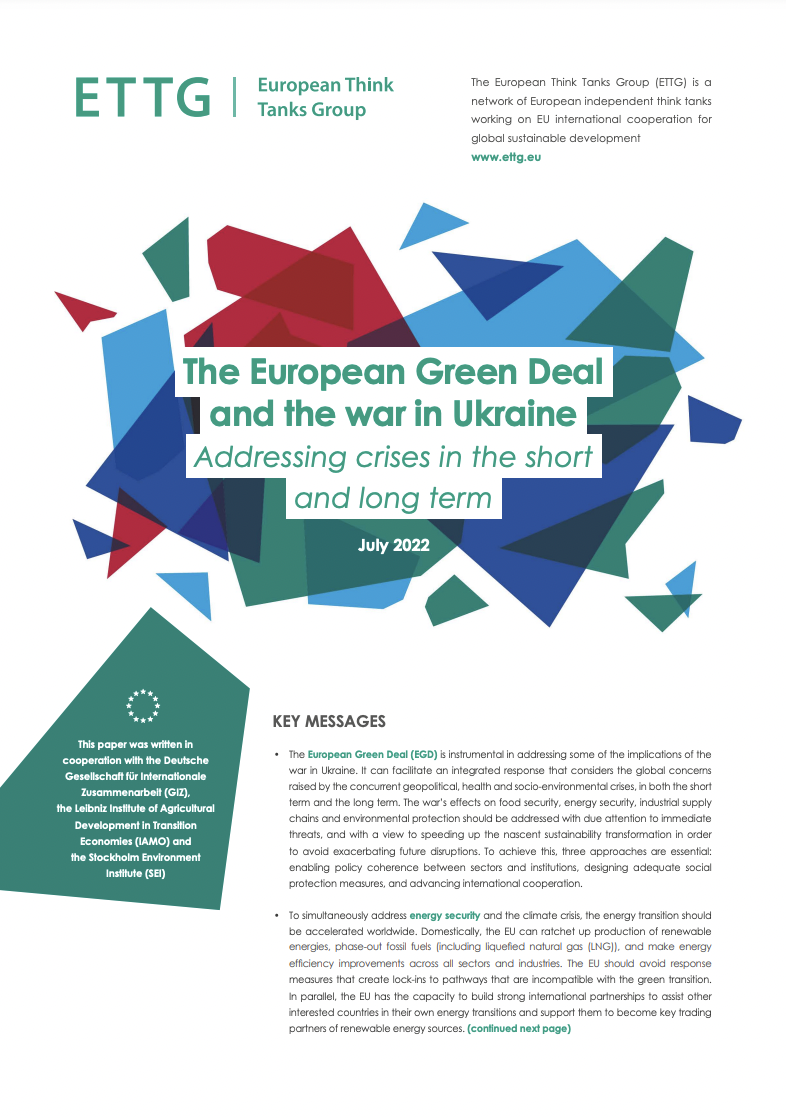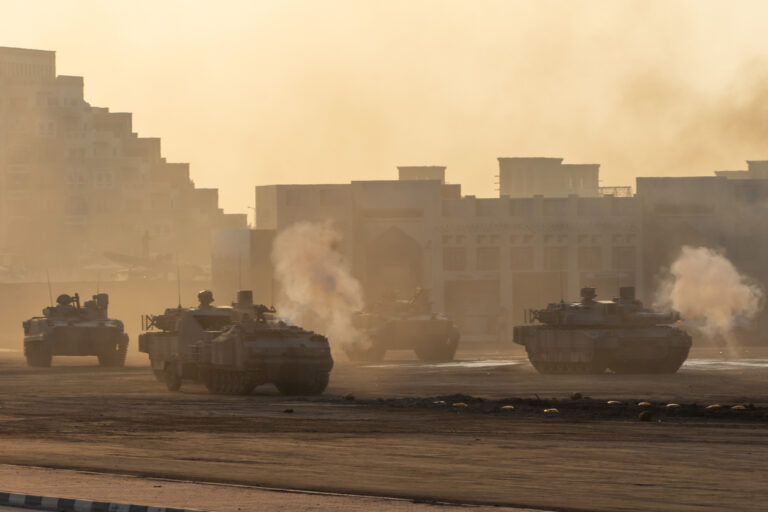
In this policy brief, we analyse the direct effects and implications of the war in Ukraine on energy security, industrial supply chains, food security and environmental protection in the EU and in developing countries. Section 2.4 also considers the ramifications of the war on Ukraine’s own environment. We also explore several integrative policy approaches to mitigate these implications, namely policy coherence, social protections measures and international cooperation.
Throughout our analyses, we consider existing and potential policy measures, and in doing so refer to the EGD’s many dimensions. We argue that the EGD is instrumental in setting the EU and its partners on a sustainable path, and key to addressing multiple crises in the short and long term. Moreover, successful implementation of the EGD can help the EU weather the shock of the war, while facilitating sustainable development that leaves no one, and no country, behind.
Key messages
• The European Green Deal (EGD) is instrumental in addressing some of the implications of the war in Ukraine. It can facilitate an integrated response that considers the global concerns raised by the concurrent geopolitical, health and socio-environmental crises, in both the short term and the long term. The war’s effects on food security, energy security, industrial supply chains and environmental protection should be addressed with due attention to immediate threats, and with a view to speeding up the nascent sustainability transformation in order to avoid exacerbating future disruptions. To achieve this, three approaches are essential: enabling policy coherence between sectors and institutions, designing adequate social protection measures, and advancing international cooperation.
• To simultaneously address energy security and the climate crisis, the energy transition should be accelerated worldwide. Domestically, the EU can ratchet up production of renewable energies, phase-out fossil fuels (including liquefied natural gas (LNG)), and make energy efficiency improvements across all sectors and industries. The EU should avoid response measures that create lock-ins to pathways that are incompatible with the green transition. In parallel, the EU has the capacity to build strong international partnerships to assist other interested countries in their own energy transitions and support them to become key trading partners of renewable energy sources.
• Global supply chains, particularly industrial supply chains, have been disrupted by the war and related sanctions. Ukraine, Russia and Belarus supply much of the world’s key raw materials, such as neon, nickel, aluminium and palladium, and crucial goods, such as iron-derived products and fertilisers. The energy price spike and inaccessible transportation routes have further exacerbated the disruptions. As companies relocate their production and seek new suppliers, the EU should aim to incentivise low-carbon options, boost innovation and material efficiency, and support developing countries in building their own green industries.
• Food security has also been adversely affected by disrupted supply chains. In particular, developing countries reliant on food imports face serious challenges due to record high prices. The EU has already put measures in place to support short-term food security, both domestically and beyond. To mitigate future crises, it should develop long-term measures to transition the EU food system towards sustainability and support the development of resilient food systems in developing countries.
• The war in Ukraine poses a serious threat to global environmental governance, particularly with regard to environmental protection and biodiversity conservation. The war will likely influence supply chain-driven deforestation and ecosystem degradation, in part due to increasing food insecurity. The EU can support effective and smart agriculture to minimise or avoid land conversion for food or energy production, both domestically and in developing countries. In addition, the EU can play an active role in assisting Ukraine in its ever-more precarious environmental situation, and to support neighbouring countries like Poland, Slovakia, Romania and Hungary that may suffer from trans-boundary pollution.
• The war in Ukraine has exposed the urgent need for effective coordination and coherence between EU policy frameworks. To implement the EGD, internal and external trade-offs between core issue areas, such as food and environmental protection or energy and industrial supply chains, and between short-term and long-term effects, need to be minimised. Simultaneously, synergies need to be enhanced. Currently, however, the content and implementation of the EGD still follows a sectoral and siloed approach that contradicts the EU’s policy coherence ambitions. More than ever, the realisation of the EGD’s objectives requires an integrated approach to facilitate efficient alignment with long-term global agendas, such as the 2030 Agenda for Sustainable Development and the Paris Agreement.
• In the short term, social protection can help vulnerable households cope with increases in food and energy prices, through mechanisms like cash transfers, in-kind transfers and subsidies. To promote longer-term resilience, social protection can support the just transition and independence of energy and food systems by way of facilitating structural changes, for example, in terms of employment. This will require increased spending on social protection systems anchored in equity concerns.
• With regards to its international cooperation, the EU still needs to define the goals it seeks to attain under the external dimension of the EGD. These will need to be translated into concrete actions in close dialogue with the EU’s partner countries. Moreover, international cooperation must be aligned to support long-term strategies to implement the 2030 Agenda for Sustainable Development and the Paris Agreement in a synergistic fashion. This requires a policy space for accountability and learning, through continuous monitoring and evaluation of pertinent international cooperation activities and partnerships. The EU also has the important role of building trust between partner countries and demonstrating international leadership in the face of Russia’s geo-political belligerence.
Read the full paper here.
On October 11, 2022 we organised an DG INTPA Infopoint event on “The European Green Deal and the war in Ukraine: Addressing short and long-term crises” which was based on our publication. More details about the event and for the recorded video you can find here.
Coordinating lead authors: Gabriela Ileana Iacobuţă and Alexia Faus Onbargi (IDOS)
Section lead authors: Nathalie Bolduc (IDDRI), Adis Dzebo (SEI), Alexia Faus Onbargi (IDOS), Gabriela Ileana Iacobuţă (IDOS), Niels Keijzer (IDOS) and Daniele Malerba (IDOS)
Contributing authors: Damien Barchiche (IDDRI), Nicolas Berghmans (IDDRI), Mauricio Böhl (IDOS), Fabrizio Botti (IAI), Michael Brüntrup (IDOS), Koen Dekeyser (ECDPM), Ines Dombrowsky (IDOS), Élise Dufief (IDDRI), Elisabeth Hege (IDDRI), Nicolas Heger (GIZ), Jonas Hein (IDOS), Alfonso Medinilla (ECDPM), Jean-Carlo Rodríguez de Francisco (IDOS), Florian Schierhorn (IAMO) and Zoha Shawoo (SEI)
Full paper reviewers: Steffen Bauer (IDOS) and San Bilal (ECDPM)
Reviewers: Mariya Aleksandrova (IDOS), Margherita Bianchi (IAI), Clara Brandi (IDOS), Lukas Hermwille (Wuppertal Institute), Hanne Knaepen (ECDPM), Geert Laporte (ETTG/ECDPM), Anna Pegels (IDOS), Andreas Stamm (IDOS) and Marjanneke J. Vijge (Utrecht University)
This paper was written in cooperation with the Deutsche Gesellschaft für Internationale Zusammenarbeit (GIZ), the Leibniz Institute of Agricultural Development in Transition Economies (IAMO) and the Stockholm Environment Institute (SEI).
Photo by Elena Mozhvilo on Unsplash.
The views are those of the authors and not necessarily those of ETTG.




